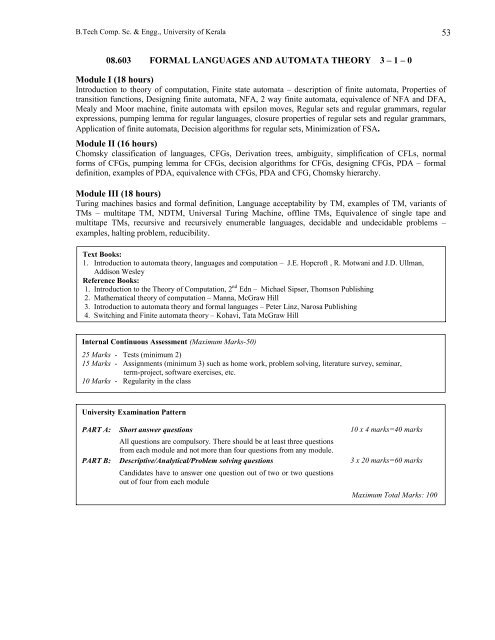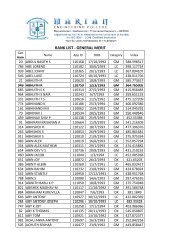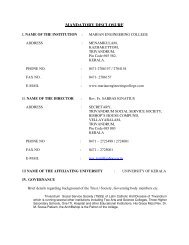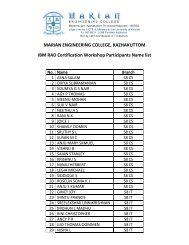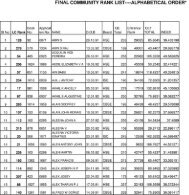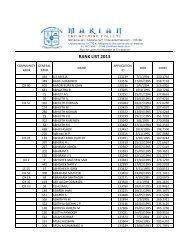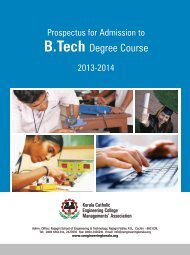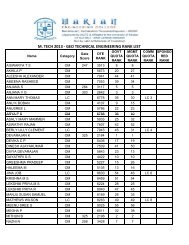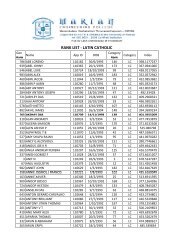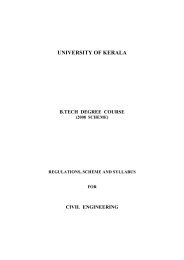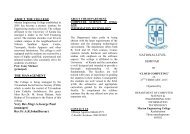UNIVERSITY OF KERALA - Marian Engineering College
UNIVERSITY OF KERALA - Marian Engineering College
UNIVERSITY OF KERALA - Marian Engineering College
You also want an ePaper? Increase the reach of your titles
YUMPU automatically turns print PDFs into web optimized ePapers that Google loves.
B.Tech Comp. Sc. & Engg., University of Kerala 53<br />
08.603 FORMAL LANGUAGES AND AUTOMATA THEORY 3 – 1 – 0<br />
Module I (18 hours)<br />
Introduction to theory of computation, Finite state automata – description of finite automata, Properties of<br />
transition functions, Designing finite automata, NFA, 2 way finite automata, equivalence of NFA and DFA,<br />
Mealy and Moor machine, finite automata with epsilon moves, Regular sets and regular grammars, regular<br />
expressions, pumping lemma for regular languages, closure properties of regular sets and regular grammars,<br />
Application of finite automata, Decision algorithms for regular sets, Minimization of FSA.<br />
Module II (16 hours)<br />
Chomsky classification of languages, CFGs, Derivation trees, ambiguity, simplification of CFLs, normal<br />
forms of CFGs, pumping lemma for CFGs, decision algorithms for CFGs, designing CFGs, PDA – formal<br />
definition, examples of PDA, equivalence with CFGs, PDA and CFG, Chomsky hierarchy.<br />
Module III (18 hours)<br />
Turing machines basics and formal definition, Language acceptability by TM, examples of TM, variants of<br />
TMs – multitape TM, NDTM, Universal Turing Machine, offline TMs, Equivalence of single tape and<br />
multitape TMs, recursive and recursively enumerable languages, decidable and undecidable problems –<br />
examples, halting problem, reducibility.<br />
Text Books:<br />
1. Introduction to automata theory, languages and computation – J.E. Hopcroft , R. Motwani and J.D. Ullman,<br />
Addison Wesley<br />
Reference Books:<br />
1. Introduction to the Theory of Computation, 2 nd Edn – Michael Sipser, Thomson Publishing<br />
2. Mathematical theory of computation – Manna, McGraw Hill<br />
3. Introduction to automata theory and formal languages – Peter Linz, Narosa Publishing<br />
4. Switching and Finite automata theory – Kohavi, Tata McGraw Hill<br />
Internal Continuous Assessment (Maximum Marks-50)<br />
25 Marks - Tests (minimum 2)<br />
15 Marks - Assignments (minimum 3) such as home work, problem solving, literature survey, seminar,<br />
term-project, software exercises, etc.<br />
10 Marks - Regularity in the class<br />
University Examination Pattern<br />
PART A: Short answer questions 10 x 4 marks=40 marks<br />
All questions are compulsory. There should be at least three questions<br />
from each module and not more than four questions from any module.<br />
PART B: Descriptive/Analytical/Problem solving questions 3 x 20 marks=60 marks<br />
Candidates have to answer one question out of two or two questions<br />
out of four from each module<br />
Maximum Total Marks: 100


